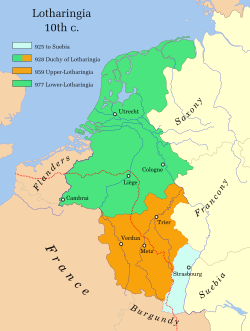Lower Lotharingia
| Duchy of Lower Lorraine | |||||
| Neder-Lotharingen | |||||
| Part of East Francia until 962 Part of Holy Roman Empire |
|||||
|
|||||
|
Green: Lower Lorraine after 977
|
|||||
| Capital | Not specified | ||||
| Languages |
Old Dutch Old Frisian Old French Old Low German |
||||
| Religion | Christianity | ||||
| Government | Duchy | ||||
| Duke | |||||
| • | 959–964 | Godfrey I (first) | |||
| • | 1142–1190 | Godfrey III (last) | |||
| Historical era | Middle Ages | ||||
| • | Established | 959 | |||
| • | Disestablished | 1190 | |||
| Today part of |
|
||||
The Duchy of Lower Lorraine or Lower Lotharingia (also referred to sometimes as Lothier or Lottier in titles), established in 959 was a stem duchy of the medieval Kingdom of Germany, which encompassed almost all of the modern-day Netherlands (including Friesland), mid and eastern Belgium, Luxemburg, the northern part of the German Rhineland province and the eastern parts of France's Nord Pas De Calais region.
It was created out of the former Middle Frankish realm of Lotharingia under King Lothair II, that had been established in 855. Lotharingia was divided for much of the later ninth century, reunited under Louis the Younger by the 880 Treaty of Ribemont and upon the death of East Frankish king Louis the Child in 911 it joined West Francia under King Charles the Simple. It then formed a duchy in its own right, and about 925 Duke Gilbert declared homage to the German king Henry the Fowler, an act which King Rudolph of France was helpless to revert. From that time on Lotharingia (or Lorraine) remained a German stem duchy, the border with France did not change throughout the Middle Ages.
...
Wikipedia


